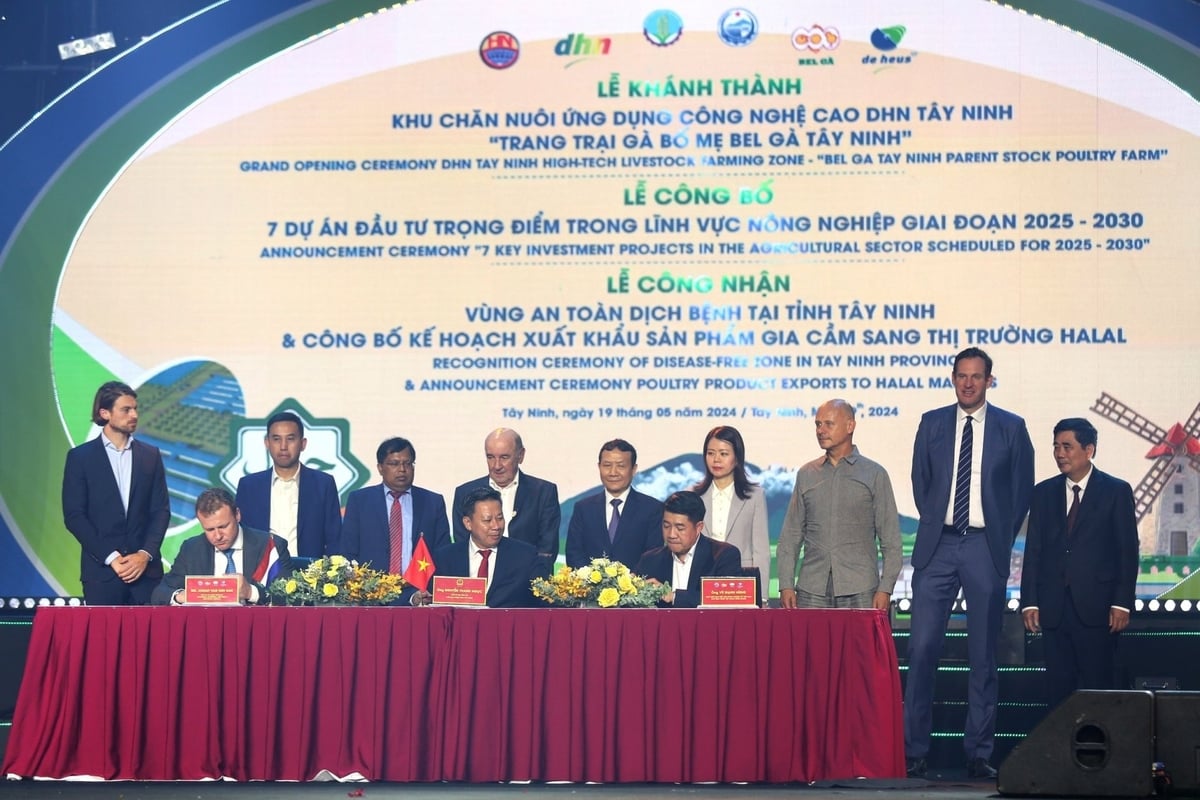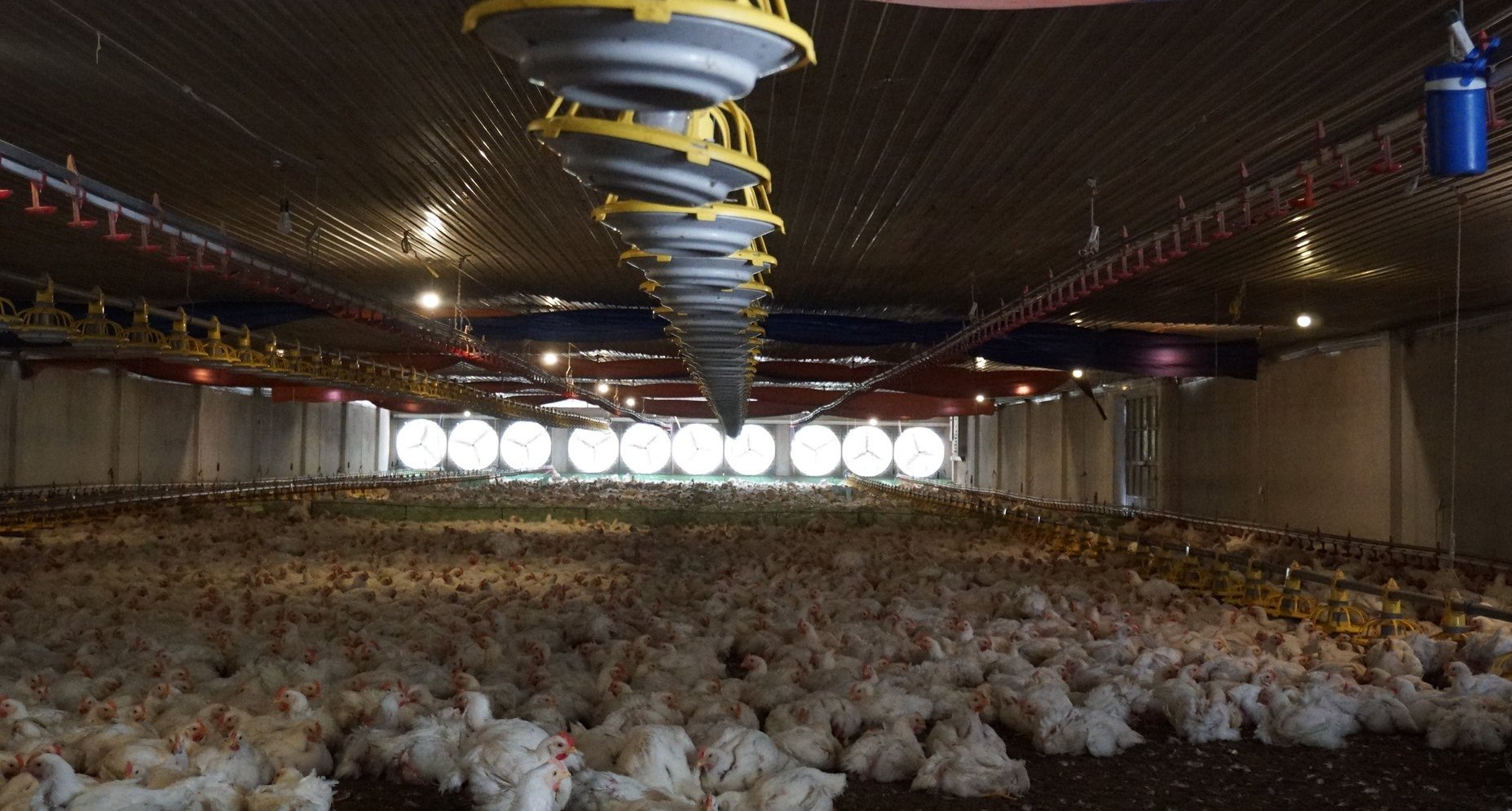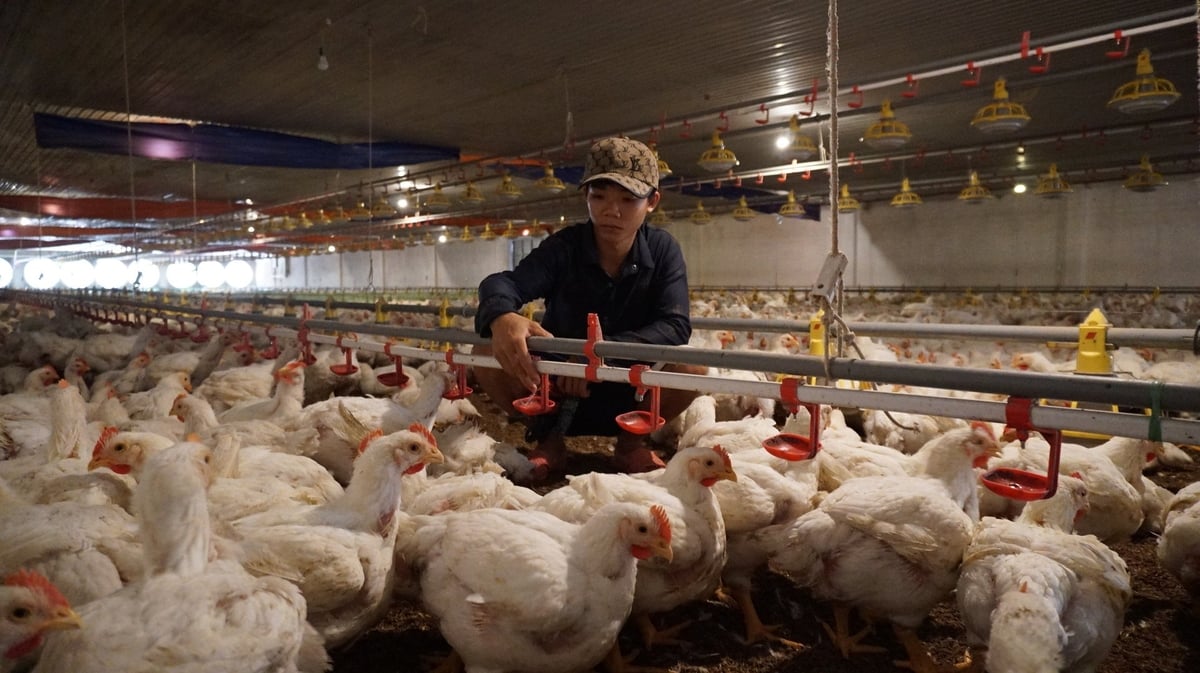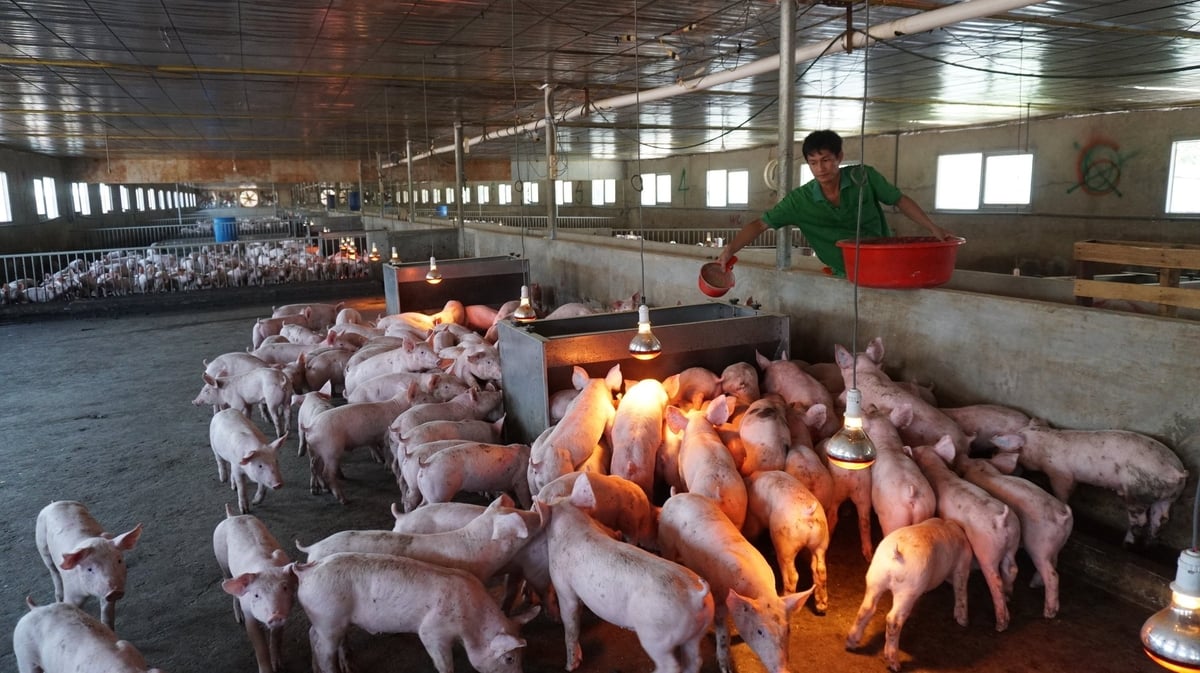May 30, 2025 | 02:52 GMT +7
May 30, 2025 | 02:52 GMT +7
Hotline: 0913.378.918
May 30, 2025 | 02:52 GMT +7
Hotline: 0913.378.918

Leading livestock enterprises are choosing Tay Ninh as their investment destination. Photo: Tran Trung.
Tay Ninh benefits not only from its favorable location and climate but also from a well-developed irrigation system that plays a crucial role in promoting livestock farming. With an abundant water supply, many large-scale farms and enterprises in the area are adopting circular farming models, using water efficiently to reduce costs and environmental impact. The modern irrigation infrastructure also improves farm conditions, reduces the risk of disease outbreaks, and enhances the quality of livestock products.
Currently, Tay Ninh hosts 146 operational livestock projects and 51 under construction. These new projects are equipped with advanced, highly automated production lines, helping to establish internationally standardized livestock supply chains.
Notably, in February, De Heus Group and Hung Nhon Group broke ground on the DHP Food Processing Complex (phase 1) and two high-tech DHN livestock projects in Trang Bang Town. These projects are part of the DHN high-tech livestock chain, with a total investment of VND 2.5 trillion. According to Johan Van Den Ban, the CEO of De Heus Vietnam and Asia region, the 14.17-hectare complex, developed in partnership with Green Chicken and HP Import-Export Investment JSC, will use cutting-edge European technology to minimise emissions and reduce environmental impact.

Inside the broiler production area of a contract farming facility for De Heus Group in Tay Ninh. Photo: Tran Trung.
In addition, Hung Nhon Group, De Heus, and Bel Ga recently broke ground on two high-tech livestock projects—DHN 2 (a broiler chicken farm for export) and DHN 5 (a breeder farm)—in Tan Chau District. Covering a total area of 25 hectares, DHN 2 will have an annual capacity of 800,000 broilers raised in closed, climate-controlled facilities, while DHN 5 will produce 196,000 high-quality laying hens per year, supplying over 20 million eggs for both domestic consumption and export.
All livestock areas are developed in accordance with Global G.A.P. standards, employing cutting-edge technology from leading global corporations. The farms integrate green technologies that minimise environmental impact, conserve resources, and ensure animal welfare.
Vu Manh Hung, Chairman of Hung Nhon Group, stated that Tay Ninh has been chosen as the group’s strategic hub through to 2050, thanks to its strong potential and active support from local authorities. From now until 2030, DHN plans to invest in 12 high-tech agricultural projects in Tan Chau, with a total investment of nearly VND 10 trillion. These projects will follow a closed-loop production model that meets international ISO and Global G.A.P. standards.
Tran Van Chien, Vice Chairman of Tay Ninh Provincial People’s Committee, emphasised that the province is actively attracting investment into high-tech agriculture to enhance production value and establish a sustainable supply chain. “The projects by De Heus and Hung Nhon are highly significant, positioning Tay Ninh as a national hub for high-tech livestock farming and food processing,” he affirmed.

Advanced technology is widely implemented at concentrated livestock farms in Tay Ninh. Photo: Tran Trung.
Green growth and sustainable development have become global priorities, particularly following COP26, where Vietnam committed to achieving net-zero carbon emissions by 2050. Tay Ninh is no exception, as the province actively prepares to align with this global movement toward a “Green Tay Ninh.”
According to Nguyen Dinh Xuan, Director of Tay Ninh’s Department of Agriculture and Rural Development, in the agricultural sector, going “green” means adopting low-emission production practices—particularly in livestock farming, which is considered one of the sectors with the greatest environmental impact.
To achieve this goal, Tay Ninh’s agricultural sector is accelerating the adoption of high-tech farming methods to reduce emissions and is promoting circular economy models. These models optimise material use, lower production costs, and align with sustainable development goals, while also supporting climate change adaptation and mitigation.
At present, the province is actively attracting investment in livestock farming that aligns with its master plan. Priority is given to projects that integrate advanced technology, are environmentally friendly, use renewable energy, and apply circular economy and clean agriculture models.
“Circular economy models not only increase the value of livestock products but also reduce resource extraction and limit negative impacts on the environment, ecosystems, and human health. The transition from a linear to a circular economy is becoming a global trend—and an inevitable path for all countries, including Vietnam,” Xuan emphasised.

Biogas is converted into electricity for brooding livestock - one of the solutions adopted by farmers in Tay Ninh. Photo: Tran Trung.
The Resolution of the 11th Party Congress of Tay Ninh Province for the 2020–2025 term reaffirmed a consistent principle: “Economic growth must not come at the expense of the environment.” In alignment with the National Environmental Protection Strategy, the province has also issued an action plan through to 2030, with a vision towards 2050.
This plan aims to prevent increasing pollution and environmental degradation, ensure ecological security, and promote the development of circular, green, and low-carbon economic models—contributing to Tay Ninh’s sustainable development goals for 2030.
Green agriculture is becoming a key driver of economic and social development in the province, gradually enhancing value-added in the agricultural sector and supporting its transformation towards a modern, smart, and sustainable model.
* $1 = VND 26.120 - Source: Vietcombank.
Translated by Huong Giang

(VAN) FAO’s Director-General addresses the 5th Baghdad International Water Conference.
/2025/05/26/1716-4-nongnghiep-191706.jpg)
(VAN) Chain linkages, technological innovation, and raw material zoning are three strategic pillars for the coconut industry to strongly develop and elevate its position on the global agricultural map.
![Advanced mariculture – an inevitable trend: [4] Accompanied by scientists](https://t.ex-cdn.com/nongnghiepmoitruong.vn/608w/files/sohk/2025/05/13/1941-pgsts-vo-van-nha-140958_717.jpg)
(VAN) According to Assoc. Prof. Dr. Vo Van Nha, Director of the RIA III, the development of advanced offshore mariculture is no longer an option but an essential path for Vietnam’s fisheries sector.

(VAN) Vietnam is intensifying the development of mollusk farming areas that meet international standards, aiming for sustainable growth and enhancing its export position in the global seafood market.
![Advanced mariculture – an inevitable trend: [3] Policy-driven momentum](https://t.ex-cdn.com/nongnghiepmoitruong.vn/608w/files/doanhtq/2025/05/21/0104-0616-0348-nuoi-bien-170339_789.jpg)
(VAN) To ensure the success of offshore mariculture that uses advanced technologies, it is essential to establish supportive policies that inspire both individuals and enterprises to invest with confidence.
![Advanced mariculture – an inevitable trend: [2] Outstanding results](https://t.ex-cdn.com/nongnghiepmoitruong.vn/608w/files/sohk/2025/05/12/4632-4136-nuoi-bien-11-164117_819.jpg)
(VAN) Pilot models of high-tech offshore mariculture in Vietnam, particularly in the South Central Coast region, have demonstrated exceptional economic returns and sustainability, setting a new direction for the country’s aquaculture industry.
![Advanced mariculture – an inevitable trend: [1] Moving offshore](https://t.ex-cdn.com/nongnghiepmoitruong.vn/608w/files/phucpm/2025/05/18/0252-2436-nuoi-bien-6-162148_783.jpg)
(VAN) Mariculture using advanced technology and moving offshore is an inevitable trend, as nearshore areas increasingly reveal limitations.